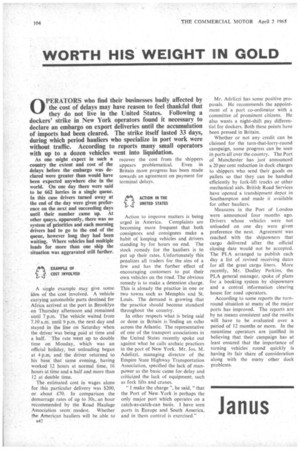WORTH HIS WEIGHT IN GOLD
Page 106

If you've noticed an error in this article please click here to report it so we can fix it.
OPERATORS who find their businesses badly affected by the cost of delays may have reason to feel thankful that they do not live in the United States. Following a dockers' strike in New York operators found it necessary to declare an embargo on export deliveries until the accumulation of imports had been cleared. The strike itself lasted 33 days, during which period hauliers who specialize in port work. were without traffic. According to reports many small operators with up to a dozen vehicles went into liquidation.
As one might expect in such a country the extent and cost of the delays before the embargo was declared were greater than would have been expected anywhere else in the world. On one day there were said to be 662 lorries in a single queue. In this case drivers turned away at the end of the day were given preference on the next and succeeding days until their number came up. At other quays, apparently, there was no system of priorities and each morning drivers had to go to the end of the queue, however long they had been waiting. Where vehicles had multiple loads for more than one ship the situation was aggravated still further.
falEXAMPLE OF COST INVOLVED A single example may give some idea of the cost involved. A vehicle carrying automobile parts destined for Africa arrived at the port in Brooklyn on Thursday afternoon and remained until 7 p.m. The vehicle waited from 7.10 a.m. until 9 p.m. the next day and stayed in the line on Saturday when the driver was being paid at time and a half. The rate went up to double time on Monday, which was an official holiday, but unloading began at 4 p.m. and the driver returned to his base that same evening, having worked 12 hours at normal time, 16 hours at time and a half and more than 12 at double time.
The estimated cost in wages alone for this particular delivery was $200, or about £70. In comparison the demurrage rates of up to 30s an hour recommended by the Road Haulage Association seem modest. Whether the American hauliers will be able to B42 recover the cost from the shippers appears problematical. Even in Britain more progress has been made towards an agreement on payment for terminal delays.
ACTION IN THE UNITED STATES
Action to improve matters is being urged in America. Complaints are becoming more frequent that both consignors and consignees make a habit of keeping vehicles and drivers standing by for hours on end. The stock remedy for the hauliers is to put up their rates. Unfortunately this penalizes all traders for the sins of a few and has the further effect of encouraging customers to put their own vehicles on the road. The obvious remedy is to make a detention charge. This is already the practice in one or two towns such as Memphis and St. Louis. The demand is growing that the practice should become standard throughout the country.
In other respects what is being said or done in Britain is 'finding an echo across the Atlantic. The representative of one of the transport associations in the United States recently spoke out against what he calls archaic practices in the port of New York. Mr. Jos. M. Adelizzi, managing director of the Empire State Highway Transportation Association, specified the lack of manpower as the basic cause for delay and criticized the lack of equipment, such as fork lifts and cranes.
" I make the charge ", he said, "that the Port of NewYork is perhaps the only major port which operates on a catch-as-catch-can basis. I have seen ports in Europe and South America, and in them control is exercised." • Mr. Adelizzi has some positive proposals. He recommends the appointment of a port co-ordinator with a committee of prominent citizens. He also wants a night-shift pay differential for dockers. Both these points have been pressed in Britain.
Whether or not any credit can be claimed for the turn-that-lorry-round campaign, some progress can be seen in ports all over the country. The Port of Manchester has just announced a 20 per cent reduction in dock charges to shippers who send their goods on pallets so that they can be handled efficiently by fork-lift trucks or other mechanical aids. British Road Services have opened a transhipment depot in Southampton and made it available for other hauliers.
Measures in the Port of London were announced four months ago. Drivers whose vehicles were not unloaded on one day were given preference the next. Agreement was reached with the shipowners that cargo delivered after the official closing date would not be accepted. The PLA arranged to publish each day a list of revised receiving dates for all the great cargo liners. More recently, Mr. Dudley Perkins, the PLA general manager, spoke of plans for a booking system by shipowners and a central information clearing house for road operators.
According to some reports the turnround situation at many of the major ports has improved. The reports are by no means consistent and the results will have to be ..evaluated over a period of 12 months or more. In the meantime operators are justified in believing that their campaign has at least ensured that the importance of turning vehicles round quickly is having its fair share of consideration along with the many other dock problems.
Janus


































































































































































